Spring 2025 Events Programme
CORTH Research Conversation: 'Research Highlights: hearing from our advisors’
Date: 3rd December, 1 - 2.30pm GMT
Location: Online (email corth@sussex.ac.uk for the Zoom details)
This session will be an opportunity to hear from some of the members of the CORTH Advisory Board as they share their research. This Term will feature Chi Eziefula (‘Menstrual health in education’), Astrid Blystad (‘Organizational and political factors that shape the production and reception of quantification: the case of maternal death reporting in Eastern Africa’) and Ulla McKnight ('Embroidery, Call-and-Response, and Creative Methods: Reimagining Participatory Approaches in Sexual and Reproductive Healthcare')
Doctoral Research Fora
Date: 6th November, 1pm - 3pm GMT
Location: Room 118, Jubilee Building
Join us for the Autumn Doctoral Fora as we share and discuss the research of the wonderful researchers and PhD students examining topics in the field of gender, sexuality, sexual/reproductive health, feminist theory, kinship, broadly. The fora is open to a wide range of scholars from disciplinary locations, to share their work in a friendly and open environment. This Fall we welcome Arushi Sahay, who will discuss their research on 'Female Sterilisation, Postoperative Imaginaries and Reproductive Futures in Northwest India'; Mingxuan Li 'Medication Use During Pregnancy: Navigating Medical Guidance and Motherhood in Contemporary China'; Gerald Mabweazara 'Framing Surrogacy in Nigeria: An Inductive Content Analysis of Media Representations, Practices, Perceptions and Policy Gaps'; Jolene Yiqiao Kong '“Beseeching for Babies” (qiuzi): When the Sacred Meets the Medical in Contemporary China’s Reproductive Journeys'; and Zara Hirji 'Approaches to Improving Access to Care and Support for Migrant, Refugee and Asylum-Seeking Women and Girls in the United Kingdom who have Experienced Gender-Based Violence - a Scoping Review'. The fora will take place in Jubilee room 118 or - for those unable to make it in-person, over Zoom. Please email corth@sussex.ac.uk for Zoom details.
CORTH Conversations
Reproductive freedom as marronage: illegal abortion and the pursuit of safety in Lagos State, Nigeria with Laurenne Ajayi
Date: 19th November, 1 - 2.30pm GMT
Location: Arts C, C233
Abortion law, rights and practice present a number of conflicts and contradictions in the context of Nigeria. Having ratified the Maputo Protocol, Nigeria subscribes to the groundbreaking regional right to abortion, yet domestic and state law remain restrictive, proscribing abortion in almost all circumstances and stipulating harsh penalties for those who fall foul. This, however, is not reflected in on-the-ground realities, which are far more complex: across all planes of this medically plural context, abortion is prevalent. The safety of these procedures, however, is contingent on circumstance, often resulting in devastating outcomes. Rights, here, remain on paper.
In the aftermath of rights critique, I seek to theorise how locally-acted, embodied modes of resistance are securing both reproductive freedom and safety in Lagos State. Drawing on fieldwork conducted in 2023, I find that while illegal abortions were historically (and oftentimes still are) unsafe, medication abortion represents a revolution in safety, and this presents just one of the methods harnessed by both the formal and informal networks who seek to create pathways to accessible reproductive healthcare. To do this I develop a concept of reproductive freedom as marronage, contending that in legally and socially restrictive contexts, reproductive freedom may be found not in the heralded landscapes of rights or justice, nor the recognised infrastructure of mainstream medicine, but the murky (il)legality of acts of reproductive resistance which make maroons of those who refuse to comply with reproductive norms.
Join us for Laurenne's seminar on her research. This is a hybrid event; if you would like to attend online, please email corth@susex.ac.uk for the Zoom details
Laurenne is a CHASE-funded doctoral researcher in the School of Law. Her research is focused on sexual and reproductive health and rights in West Africa, considering the impact (or lack thereof) of the Maputo Protocol's radical right to abortion and the ways in which reproductive freedom might be reconceived and secured.

Previous Events
"Queering Global Health" Symposium
Date: 4th June, 9am BST onward
This summer Svati Shah (University of Massachusetts) and Paul Boyce (Sussex) co-convened three workshops on the themes of Queer and Trans World Anthropologies and Queer and Trans Global Health. The anthropology focused workshops were held in two parts, at The University of Sussex and at Future Africa, Pretoria, in association with Vasu Reddy and colleagues at The University of the Free State. The meetings convened scholars working on queer and transgender socialities and becomings from Southern and Eastern Africa and South Asia. Participants explored new ways of supporting and developing queer and trans anthropologies outside of Euro-North American academic transfer zones. Bringing together innovative scholarship, we sought to reorient queer and trans perspectives and research, opening out new ontologies and collaborative connections, based on a revisiting of ‘World Anthropology’ critiques from the Global South.
The third summer workshop, on Queer and Trans Global Health, focused on interdisciplinary scholarship in transnational health research, and was co-convened by Svati and Paul along with Beth Mills and Maria Moscati (Sussex). The workshop drew together scholars and activists working in China, Cuba, India, Indonesia, Kenya, Mozambique, Nepal, South Africa, the U.K. and the U.S. We explored normative power structures in the making and unmaking of global health knowledge, creative praxis, and queer and trans archiving.
Funds were provided by The University of Massachusetts, The University of Bergen, The University of the Free State and The University of Sussex (Global Studies HEIF funding).

Research in Progress Forum
Date: 23rd May, 1pm BST onward
Location: A155 (Arts A) or over Zoom -
https://universityofsussex.zoom.us/j/3885139671?pwd=ajUyeEpRYmkrNDhGRk12OWtvenM0Zz09&omn=98363021867
Meeting ID: 388 513 9671 Passcode: 887084
The Centre for Cultures of Reproduction, Technologies, and Health (CORTH) at the School of Global Studies is pleased to invite doctoral students and PGRs to present their work as part of our Spring Term Researchers’ Forum, to be held on 23 May 2024. This is an opportunity to present work at any stage to a friendly audience made up of Centre students and faculty.
Presenters should be a current University of Sussex doctoral student and presentations should reflect on an aspect of reproduction - reproductive health, reproductive labour, reproductive technologies, legislation and law, sexuality, kinship, to name a few - which engages with scholarship on gender, sexuality, and/or feminist studies. Students don’t need to be an existing member of the Centre (although please join us if you haven’t already!). Presentations should be 15 minutes in total, followed by 5 minutes of Q&A. Refreshments provided.
For those who want to present but might not be selected for the current forum, we will host another research forum in October 2024.


On the 25th January, CORTH’s Maria Moscati joins Juliana Cesario Alvim Gomes, CEU LEGS, in Vienna for an open conversation on ‘Reproductive Rights and Strategic Litigation’. This hybrid event takes place 12 noon to 2pm GMT. The Zoom details are below, or use the QR code on the poster.
Abstract: The conversation between Maria Moscati (CORTH/Sussex) and Juliana Cesario Alvim Gomes (LEGS/CEU) will explore legal mobilizations and judicial approaches to reproductive rights in Italy and Brazil, delving into differences, similarities, challenges, and strategies
Zoom Link: https://ceu-edu.zoom.us/j/7337555540?pwd=dXN5TTQvNzhwaWkzbFJmS1piSTdUQT09
ID: 733 755 5540
Password: 504096
CORTH's Autumn Event Programme
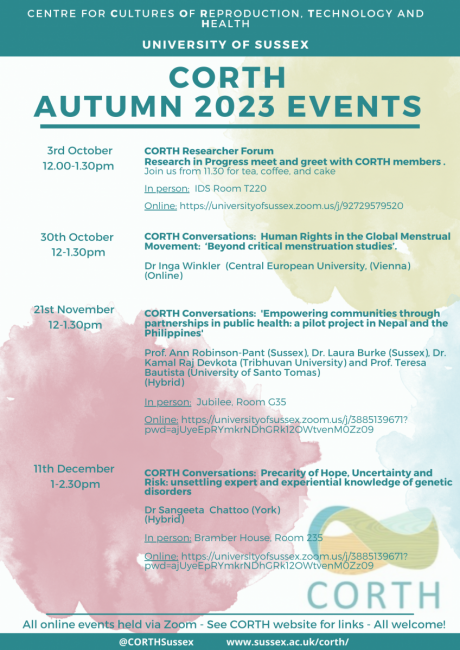
The Period Experience for Every Body
24 November 2023, 12:30 until 13:30, Meeting House
Following their popular session for International Women's Day earlier this year, BSMS and LifeScience colleagues have organised another discussion event on the topic of menstrual health with Dr. Chi Eziefula, Senior Lecturer at Brighton and Sussex Medical School (BSMS) and co-Director of CORTH, and guest speaker Jane Dancey, Somatic Health Practitioner and Educator.
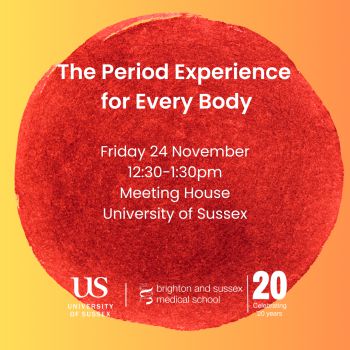
The Period Experience for Every Body : Staff Hub : University of Sussex
CORTH Conversations: 'Precarity of Hope, Uncertainty and Risk: unsettling expert and experiential knowledge of novel treatments for genetic disorders'
11 December 2023, 1 - 2.30pm GMT
This is a Hybrid event. Attendees can come in-person to Bramber Hourse room 235 or join online at https://universityofsussex.zoom.us/j/3885139671?pwd=ajUyeEpRYmkrNDhGRk12OWtvenM0Zz09 (Passcode 887084)
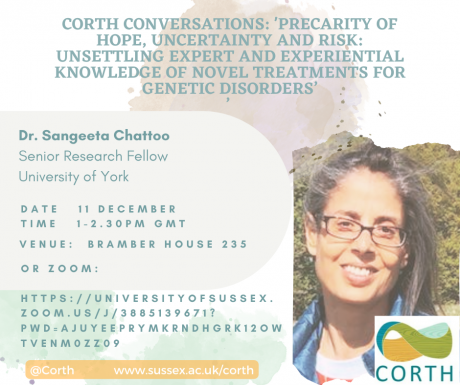
Dr. Chattoo's seminar is based on her paper that looks at the use of ‘novel’ therapies, a combination of thalidomide and hydroxyurea, in treating a potentially life- threatening genetic disorder (thalassemia). Rather than assume that medical knowledge constitutes (of) immutable stable diagnostic/ clinical categories or terms, a lack of consensus within medical/ scientific fraternity on the use of treatment regimens brings home the significance of local practices through which ‘evidence’ is framed to legitimise ‘improvisation’. In focusing on the social milieu within which the materiality of the disease is located, the notions of risk and evidence are foregrounded as processual and shifting in time. Drawing on ethnographic data on how parents of children with thalassemia in parts of rural India negotiate prognostic uncertainty and precarity of caring, knowledge and ignorance production appear as ‘intricately entangled’. The paper concludes with an ethnographer’s dilemma about how to write about what might seem, from the outside, ethically contentious though innovative practices, serving the economic interests of the clinicians and pharmaceutical firms. Yet, from inside, the narratives of parents and patients struggling to access basic care in the state system, persuade us to understand their quest for novel treatments (hope), ilaj (both treatment and cure), as part of a wider pragmatic ethic of care.
Dr. Sangeeta Chattoo is a Senior Research Fellow, in the department of Sociology, at the University of York. She started her ethnographic journey, dating back to her doctoral research on the borderland between medicine and culture in Kashmir (India) in 1985. After completing my doctorate from the University of Delhi in 1990, she taught at the University of Western Australia for two years, took a career- break for five years before joining the University of Leeds and finally migrating to York in 2006. Her research and scholarship have meandered around intersecting lines of medical knowledge and practice; inequalities and health, race, ethnicity, citizenship and governance; chronic illness, gender and caring. Sangeeta has worked extensively on health and citizenship issues of minoritised ethnic communities in the UK. For the past decade, however, she has been fascinated by the history, ontology and governance of sickle cell and thalassemia within a global context and the local engagements with emerging forms of medical practice and claims to citizenship and state. Sangeeta is on the editorial board of the medical sociology section of Frontiers and is currently co-editing a special issue (with Veena Das, Conceptualising technology in reframing the boundaries between the normal and the pathological; and a forthcoming, Handbook on Racism, Ethnicity and Health (with Hannah Bradby, Edward Elgar Press). Two of her recent articles are in Anthropology and Medicine and policy and Politics (profile at https://www.york.ac.uk/sociology/our-staff/academic/sangeeta-chattoo/)
CORTH Conversations: 'Empowering communities through University partnerships in public health: a pilot project in Nepal and the Philippines'
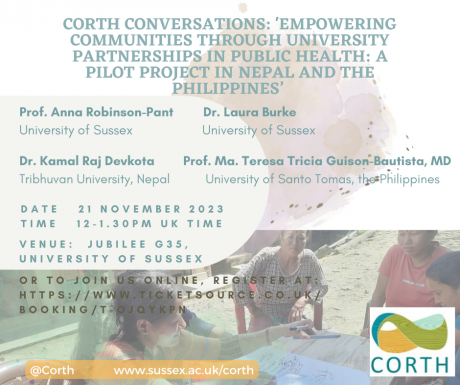
Anna is a Research Professor in the Global Studies School at Sussex. Laura is the project’s Research Assistant, a Lecturer in Global Public Health and a Researcher in decolonising health education at Sussex. Kamal is a Lecturer at the Research Center for Educational Innovation & Development (CERID) Tribhuvan University, Nepal and Teresa is a Professor with the University of Santo Tomas, the Philippines. Both Kamal and Teresa will be participating online.
Read all about the project and talk at -
'Parental Mental Health Network Conference' - An inaugural two-day Conference, bringing together academics, policy makers, clinicians, charities and people with lived experience. See the pdf. for full details of the Coference - Parental Mental Health Conference Itinerary [PDF 547.52KB]
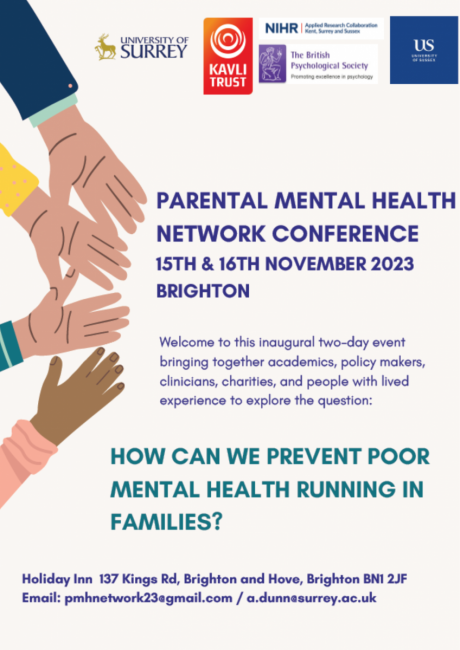
CORTH Conversations: 'Human Rights in the Global Menstrual Movement'
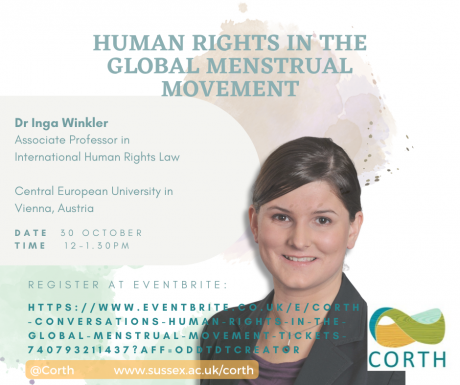
View our past events here.


